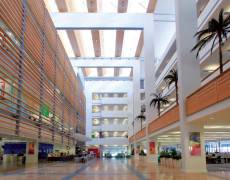June 20, 2013
Land Securities £260m development confirms City office confidence
Land Securities announcement today of a £260 million development of 1 & 2 New Ludgate, EC4, a speculative mixed-use development in the City of London confirms a growing confidence in the City office market. The 379,000 sq ft scheme occupies an island site near St Paul’s Cathedral and comprises two distinct buildings united by a new public piazza, which together aim to offer 346,000 sq ft of office accommodation set around open and green spaces. Colette O’Shea, Head of Development, London said: “Our decision to commence the speculative development of 1 & 2 New Ludgate reflects our confidence both in the City office market, where we believe supply of new space will be constrained in 2015, and in the quality of the attractive and highly efficient office space we are creating.” (more…)



















June 19, 2013
Five essential things to consider before you implement a BYOD policy
by Julia Johnston • Comment, Facilities management, Technology, Workplace
BYOD is far more than just allowing your staff to check their email on their personal mobile. It’s about the security of corporate information – we’re all demanding more flexible working to fit our lifestyles, but with flexibility comes personal responsibility. Are we rushing to join the BYOD party without realising some of the more serious considerations. A recent article on OfficeInsight considered a Gartner survey which suggested that BYOD would be prevalent by 2017. The article implied that companies should embrace this as an inevitable change. Before we get too excited, though, let’s explore some of the issues that BYOD should be raising for employers – including the technical demands that these policies make on IT departments and infrastructure, and the compliance IT departments will demand of staff.
(more…)